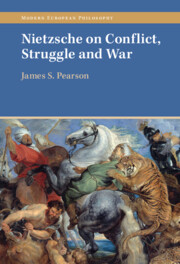Introduction
Published online by Cambridge University Press: 16 June 2022
Summary
We begin by surveying a rift that runs through the history of philosophy. On the one side stand those philosophers who denigrate conflict as a burden on human existence; on the other stand those who praise it as a productive, strengthening mode of relation. The goal of this book is to elucidate Nietzsche’s contribution to this debate. With this end in mind, we make a brief survey of the intellectual context that informs his unique understanding of conflict. We then turn to some of the key problems that face us in our attempt to extract a coherent philosophical viewpoint from his writings on this topic. First, his terminology is prima facie ambiguous, and it is often unclear what he means when he uses the vocabulary of conflict. Second, across different texts he can be found to positively and negatively value almost all subspecies of conflict. Third, commentators tend to focus on either the hard or the soft – that is, either the violent or nonviolent – aspect of Nietzsche’s philosophy. This gives the impression of there being a contradiction in his normative stance toward conflict. I close by giving an outline of the book and how it resolves these various tensions.
- Type
- Chapter
- Information
- Nietzsche on Conflict, Struggle and War , pp. 1 - 36Publisher: Cambridge University PressPrint publication year: 2022

